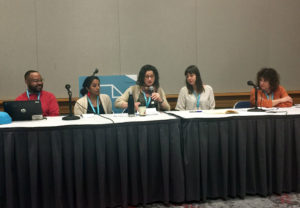Exploring How Faith Shapes the Artist
 Participants on the panel "Art and Identity: How Race, Faith, & Sexuality Shape Us" at the 2019 Association of Writers & Writing Programs conference.
Participants on the panel "Art and Identity: How Race, Faith, & Sexuality Shape Us" at the 2019 Association of Writers & Writing Programs conference. At the 2019 Association of Writers & Writing Programs (AWP) conference in late March, five writers of fiction, poetry, and comedy came together for a panel titled “Art and Identity: How Race, Faith, & Sexuality Shape Us.” Below are snippets from this conversation, highlighting some of the authors’ perceptions.
Elmaz Abinader, poet, memoirist, playwright, and novelist
People tend to assume that the way I’ve lived has been within the realm of the larger Arab identity, when in fact I grew up in a place where there were no other Arabs. Also, I was raised uber-Catholic.
I don’t have a religion anymore, but I believe in a lot of basic moral things. And I try to give my characters a moral compass with which my reader can identify. It doesn’t have to be associated with a particular religion or faith, but there has to be a sense that there are guiding principles that not only move us through the world but also guide us with our interactions in the world.
We have bombings and other horrific events happening at places of faith that should really rip us apart and rebuild us in a way that we want to change the world. But it doesn’t. So what happened to that thread going through our society around what our morality is and how we respect religion, regardless if it’s our way to worship or not?
Vernon Keeve, writer and educator
I grew up in a Southern Baptist household where my father was a pastor. So I approached religion from a place of fear. This was during a period when churches were being vandalized and set on fire. Also, in the church I was made to feel afraid of people around me. I knew I would be shunned if I came out as gay.
One day I realized this was never my story to begin with. I don’t need to fear this. I began to explore other religions like Buddhism that were more in line with my thinking. Religion is something I’m still grappling with and exploring. I’m trying to figure out myself and learn the true religion of the Nigerian people, who are my ancestors.
I’m very much this person who is exploring blackness, and I hope my writing can push some of this toxic masculinity out and bring in some of this soft masculinity.
Laura Joyce Davis, author and Fulbright Scholar
The Christianity I see portrayed in the media is very different from what I’ve experienced personally. The church has been responsible for a lot of terrible things throughout history—actions and attitudes that Jesus himself condemned. The faith I know laments those wrongs and seeks to bring healing to the broken places in our world.
Nina LaCour, National bestselling author
In traveling around the country and meeting so many teenagers as part of my job, I have seen teenagers who have been rejected by their families and the church because of their sexuality over and over again in ways that are infuriating and so incredibly damaging. But I’ve also seen pastors bring their queer kids to my readings and supporting them in that way. Hopefully, things will continue to change in that direction.
Shanthi Sekaran, novelist and essayist
If you write a book about faith, it allows for a lot of assumptions about your faith practice. I’m not the best Hindu. Just ask my mom. My first book, The Prayer Room, was very heavily based on the day-to-day domestic practice of Hinduism, and I’ve always connected to Hinduism through story. Readers relate to story, it’s how they understand the world. It’s much harder to harden oneself against another human being if you know their story.
As a Hindu and Indian, I’ve always felt erased, as Hinduism has been commodified and cherry-picked. Hinduism has gone from being in a position of obscurity about thirty years ago to a point at which it’s now used to sell consumer products. Hinduism is a religion that has so many permutations and ways of practice. What is the daily story of your faith and what does it mean to not practice your faith or not be as devoted? As a writer, I’ve had to stop and pause and take a step back regarding what society is saying about my religion, and think what it means to practice or not practice my religion.
We’re so quick to paint things as faith based and religious or as secular, and people are so quick then to either embrace that religion or turn away from it. The actual experiences of people are more nuanced. Some people go to church simply because their family goes to church. Our public consumption of faith does not necessarily reflect our private practice.
Despite the push by atheist activists to proclaim the death of God, these authors take a more reflective tone in exploring how their culture informed their development as artists. This nuanced conversation is reflective of the larger shift in American culture, as people increasingly move away from organized religion.
With only 37 percent of the “nones” citing a lack of belief in God for why they no longer affiliate with a particular religion, this panel appeared to reflect a desire to move beyond debates about the existence of God or gods. Can humanists play a role in creating spaces such as these where people can explore how to utilize their talents to speak their truth in an increasingly pluralized but also polarized and politicized world?
